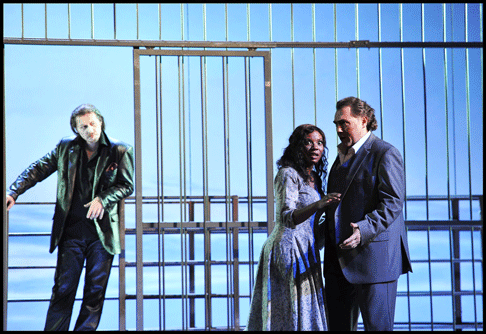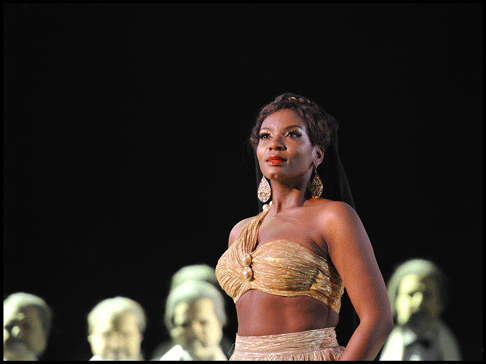17 May 2010
Mefistofele in Montpellier
Back in 1989 Ken Russell opened his Genovese Mefistofele with heavenly choirs contemplating the divinity of a praying mantis.

Back in 1989 Ken Russell opened his Genovese Mefistofele with heavenly choirs contemplating the divinity of a praying mantis.
Earlier this spring Jean-Louis Grimpa had a flock of chickens perform his Falstaff in Monaco, though just now messieur Grimpa resurrected his 2007 Liège (Belgium) Mefistofele in Montpellier (May 4) with actual homo sapiens to embody Goethe’s Faustian characters.
Not that these humans brought any deep humanity to Boito’s highly concocted version of the Goethe Faust as Jean-Louis Grimpa rendered this austere battle of the here and the hereafter as pure farce. Mr. Grimpa does have valid claim to knowing earthly pleasures as he was born in Monaco and is now the intendant of the Monte Carlo opera, his treatment of this Faust opera however quells speculation as to any possible spiritual credentials.
The Opéra National de Montpellier was a willing partner in the project, assembling a fine cast that brought added dimension to operatic farce, notably tenor Argentine Gustavo Porta as Faust who exploits the complete catalogue of tenor mannerisms in unrelenting spinto projection, and young American soprano Takesha Meshé Kizart as Margherita who shows herself a committed student of diva mannerisms that she is instinctively placing in the service of her fine Italianate instrument.
Boito’s opera gave these two singers ample opportunity to show their stuff and that they did, strutting as singers might but coming close to giving us the splendid, over-ripe vocalism that will flower in post Verdian opera. Mlle. Meshé Kizart delivered the vivid prison scene that heralds her salvation moving effectively between chest and head voice, and ultimately arriving at a qualified artistic salvation of her incipient diva mannerisms. Mr. Porta knew that he was artistically saved all along because we are all suckers for Italian tenors.
In its program booklet Montpellier pronounced the Mefistofole premiere to be in 1868 at La Scala, though what we heard was the much modified (and significantly shortened) 1881 version that pleased audiences who preferred real Italian opera and cared little about Teutonic philosophy. Like its reviled predecessor (Gounod’s 1859 version) its operatic heart winds up in the tempestuous Faust/Margarite encounter. Boito was however undaunted by the Goethe Book II which he incorporates in the last two of his opera’s seven scenes — Helen of Troy’s seduction of Faust and finally the salvation of Faust.
The oblique progression of Faust’s salvation and Mefistofele’s defeat in this final version lends itself to farce because its story became so simply told in such brief terms. Where Ken Russell’s brilliant metaphors deepened an audience’s intellectual involvement and thereby retained Goethe’s seriousness Jean-Louis Grimpa realizes Mefistofele as an arch-villain who materializes dressed in a red velvet suit and bathed in red light. He parades himself in front of the heavenly choirs seated on bleachers amidst floating clouds.
And from this moment on Mr. Grimpa with Boito demand that their Mefisto tower over every scene. The name of the opera after all is Mefistofele. That he did. Russian bass Konstantin Gorny made the Mefisto of your dreams, charming and seductive he exuded a irresistible commitment to pleasure that never flagged. His grandest moment occurred when, banned from the ancient world (because he did not yet exist) he exulted in Grecian beauty from the audience, perched on a balcony railing, legs dangling into the void.

Mr. Grimpa and his accomplices, set designer Rudi Sabounghi and costume designer Buki Shiff, are theatrically savvy indeed. The set was minimalism at its most eloquent, a downstage false proscenium made of worldly wood against heavens rendered by projected clouds and mists, and mirrors to make it infinite. Though Mefisto simply changed into a black leather suit to become Faust’s mentor chorus costuming was quite elaborate They were first white robed angels, then a huge variety of circus players, then black and white spirits later becoming toga draped Greeks, and once again white robed angels, a hundred or so of them. No expense spared to create this spectacle.
This witty costuming more than anything else created the farce, and the movements of the players effected by director Grimpa complemented these costuming abstractions. Mr. Grimpa consistently utilized extended diagonal movement that accelerated Boito’s already sketchy story telling. Faust’s seduction of Margarite as example was a masterpiece of stage direction interweaving Mefisto resisting Martha’s advances with Faust pursuing Margarite in movement that was linearly musical (in perfect step with Boito’s complex quartet) rather than theatrically dramatic.
The pit was entrusted to French conductor Patrick Davin who kept the massive choral and orchestral forces required by Boito in absolute control without neglecting the construction of the opera’s huge climactic moments. That these climaxes were rarely satisfying can possibly be blamed on Boito’s compositional naivete, as perhaps the thwarted musical resolutions of some of the arias can be as well. Or maybe Mo. Davin is just not Italian.

The stars of this show were the choruses, one hundred or so (the chorus from Wallonie journeyed down to join the Montpellier chorus) plus thirty or so singing cherubs. While Boito’s grand choruses did sometimes expose naivete, at other times he pulled out the stops to create complex choral structures, notably the giant fugue in witches‘ Sabbat scene, impeccably executed with appropriate glee. To the aplomb of this choral accomplishment you can add that of the children’s chorus, delivering difficult part writing never out of sync with Mo. Davin.
And finally, Faust saved, Mefistofele was driven from the scene, pelted with rose petals hurled [!] by three innocent cherubim, as clouds of rose pedals floated down from the Opéra Berlioz ceiling coating the audience with one last bit of heavenly fun.
Michael Milenski